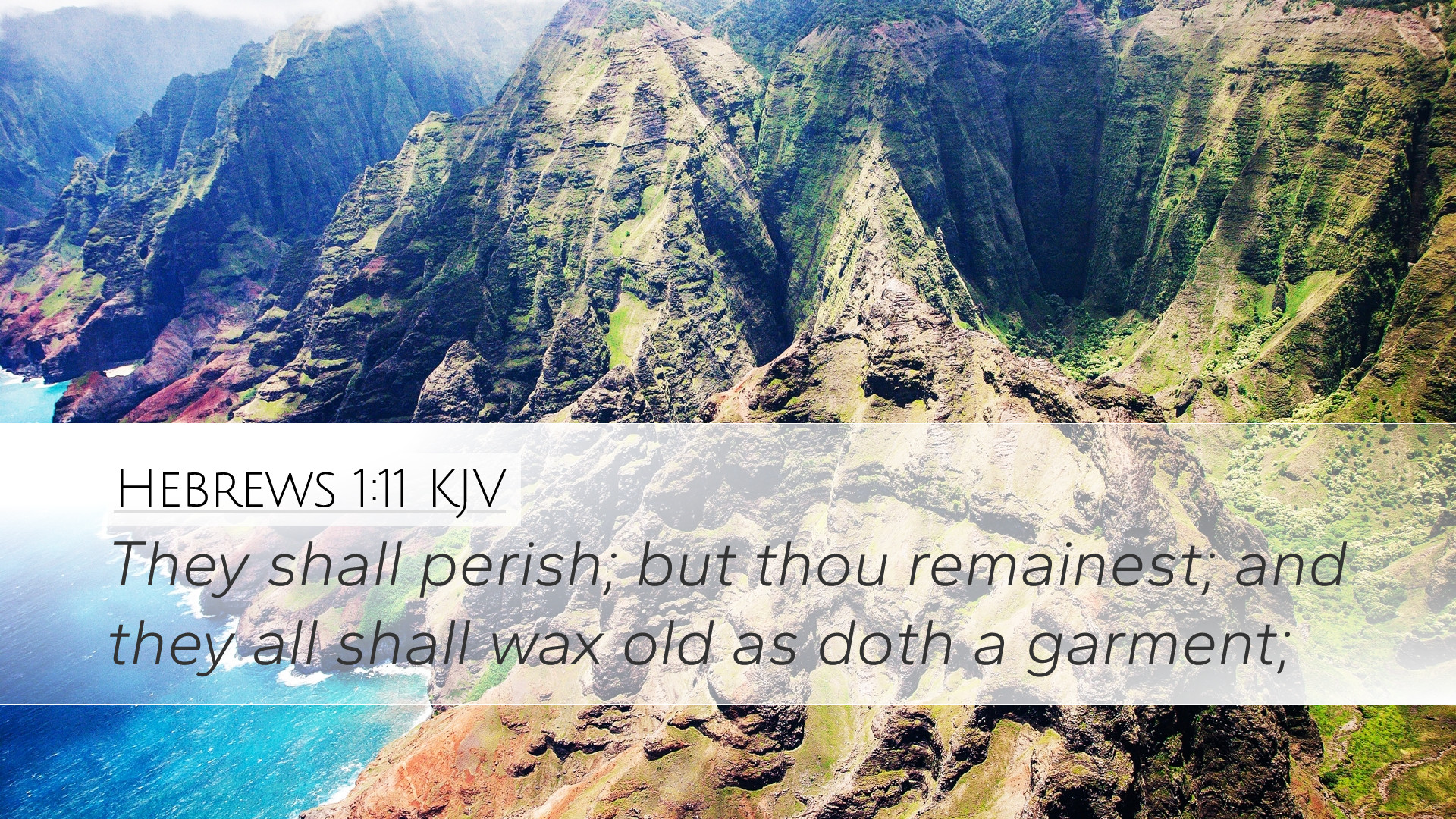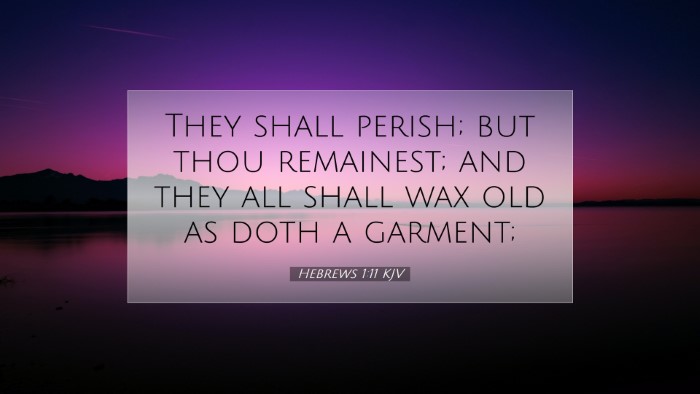Old Testament
Genesis Exodus Leviticus Numbers Deuteronomy Joshua Judges Ruth 1 Samuel 2 Samuel 1 Kings 2 Kings 1 Chronicles 2 Chronicles Ezra Nehemiah Esther Job Psalms Proverbs Ecclesiastes Song of Solomon Isaiah Jeremiah Lamentations Ezekiel Daniel Hosea Joel Amos Obadiah Jonah Micah Nahum Habakkuk Zephaniah Haggai Zechariah MalachiHebrews 1:11
Hebrews 1:11 KJV
They shall perish; but thou remainest; and they all shall wax old as doth a garment;
Hebrews 1:11 Bible Commentary
Commentary on Hebrews 1:11
Hebrews 1:11 states, "They will perish, but you remain; they will all wear out like a garment." This verse serves as a pivotal point in the discourse of the expansive superiority of Christ over creation. In this summary commentary, we will explore insights from various public domain sources to elucidate the theological richness of the text.
Contextual Overview
The Book of Hebrews is attributed to an unknown author and is addressed primarily to Jewish Christians facing persecution and challenges regarding their faith in Christ. The first chapter establishes Christ’s superiority over angels, emphasizing His divine nature and the permanence of His kingdom. In this context, our verse highlights the contrast between the eternal nature of Christ and the transient nature of creation.
Theological Insights
-
Contrast of Permanence and Impermanence:
Matthew Henry notes that while the world and its elements are fleeting, Christ's existence is unchangeable. This dichotomy serves to reassure believers of the stability found in Christ amid life’s uncertainties.
-
The Garment Analogy:
Adam Clarke provides insight into the analogy of garments that will wear out. He explains that garments, despite being valuable and necessary in their time, are ultimately subject to decay and destruction. This vividly illustrates the temporal nature of the created order compared to the eternal throne of Christ.
Implications for Believers
In recognizing the permanence of Christ, believers are called to place their trust not in the transient things of this world, but in the enduring promise of Christ's reign. Albert Barnes emphasizes the practical implications for the faith community, suggesting that believers should “look to Jesus, who remains steadfast.” This serves as an admonition against the tempests of doubt and fear that can arise in a world that appears to be in constant flux.
Encouragement Amidst Persecution
Knowing that their Savior will not perish encourages believers to maintain their faith even amid tribulation. The temptation to return to former ways, as suggested in earlier chapters of Hebrews, is directly countered by this reminder of Christ’s eternal nature.
Christ’s Authority Over Creation
Hebrews 1:11 reaffirms the authoritative position of Christ in relation to creation. Matthew Henry asserts that the superiority of Christ is not merely positional but ontological. He is the active sustainer of the universe, contrasting with created beings that, despite their orders and roles, will ultimately fade away.
The Unchangeable Nature of Christ
It is critical for students and practitioners of theology to understand the unchangeable nature of Christ as a bedrock of Christian doctrine. Adam Clarke contrasts the uncreated nature of Christ with the finite constructs of the world, suggesting that the permanence of Christ is an invitation to believers to engage deeply with His teachings.
In Light of Old Testament Allusions
This verse takes on additional significance when viewed through the lens of Old Testament scripture. The imagery of garments wearing out echoes themes from Psalms (e.g., Psalm 102:25-27), where the psalmist acknowledges the transient nature of the heavens and earth in contrast to God’s eternity. The author of Hebrews seamlessly weaves these references to showcase Christ as the fulfillment of these prophetic themes.
Conclusion
Hebrews 1:11 serves as a profound reminder to all believers of the transient nature of creation and the eternal nature of Christ. By integrating interpretations from Matthew Henry, Albert Barnes, and Adam Clarke, we see the robustness of Scripture as it calls us to place our faith firmly in the One who remains. Believers are encouraged to hold fast amidst trials, knowing that though the world may perish, their Savior stands forever.


